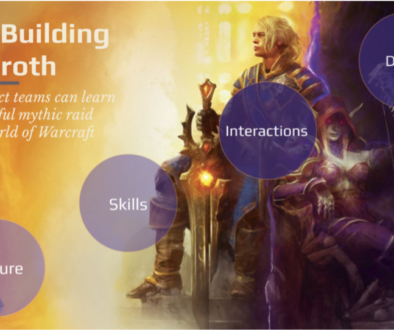Earning the title of Gamer
 Do you play Farmville or any of the other what seem like thousands of passive games on Facebook? Do you enjoy it? Get something out of it? If so, you probably don’t want to read any further. Head back to your Facebook page and continue to spew your digital litter all over the place and I’ll continue to toss your pixels wasted on your mind numbing updates into the digital recycle bin.
Do you play Farmville or any of the other what seem like thousands of passive games on Facebook? Do you enjoy it? Get something out of it? If so, you probably don’t want to read any further. Head back to your Facebook page and continue to spew your digital litter all over the place and I’ll continue to toss your pixels wasted on your mind numbing updates into the digital recycle bin.
Don’t get me wrong, I don’t hold the fact you play the games against you – but please don’t be offended if I do not share in the excitement or even interest of your overzealous updates on your latest point-click-refresh time sink.
Now, I’m just as guilty as the next 4sq’r on your list. Yes, I’ll admit to that. But, you also have to admit you rarely see a 4sq update from me, and when you do it’s someplace really cool and usually with friends. Most of the check ins I never publish to my feeds and if it takes any longer than 30 seconds to check in, I get over it and move on.
That being said, does anyone else feel like the concept of gaming (for the record I don’t necessarily agree with calling these passive apps games), has been dumbed down? What ever happened to the days of gaming wizards, hackers fighting hackers, hacking war games, pissing off that hacker girl you like by beating her at her favorite game, or being picked to do real battle for your leet arcade skills?
That’s just it, the crux of this post, gaming used to be synonymous with having skills. Working for 3DFX, we even used games to compete with one another for special privileges like hosting the booth at Quakecon. I remember the days of Atari (yes I was young, but I played it!); when pizza joints had arcade tables where you could eat and at the same time play Pacman with a friend; the awesomeness of playing against someone in Street Fighter and Mortal Combat at the arcade; beating Super Mario and Paper Boy for the first time on the NES; and even playing games on the now defunct Dreamcast and Sega Saturn.
My first exposure to PC games was Doom, then on to Quake and Unreal Tournament, and I definitely remember enjoying Myst, 7th Guest, and Myth. From there I moved on to Diablo / Diablo II, & Warcraft I/II/III. (Gotta give Blizzard props for having games that came out on PC and Mac at the same time – this is what won me over to them early on.) Can’t forget the original Sims (though it’s been hard for me to get into the latest version and I’ll admit only played Spore a few hours). Hell, I remember playing the first Halo game when it came out and finding it funny that it took Microsoft buying Bungie, who was originally a Macintosh game developer (anyone remember Oni?), to put out a great game.
These days I’m all about Borderlands (via Steam and my ever expanding library of games there), WoW (/played since Nov 23, 2004), as well as games like Little Big Planet, any of the Lego games (Batman, Star Wars, and Harry Potter are my favs so far), and many many others on multiple computers, consoles, and hand held devices.
I don’t mean to spark a debate here over what should and should not be called a game, or even the quality of the games themselves – this is more about the gaming experience and what it means to self identify or earn the title of Gamer. This is by no means the type of academic post most are used to seeing here, it’s more of an opinion piece. My opinion is simple – games should take mental skills, actual effort, quick thinking, consequences of making critical choices, and even some practice.
If you’re playing a game that doesn’t require these things, especially the making you think part, well perhaps you should try them sometime. Then, maybe we can talk gamer to gamer. Until that time, I’ll continue to block your point-click-refresh posts off my Facebook feed and decline every single invitation you send my way. Look me up when you want to waste time with me playing a real game. I promise not to beat you too bad, – the first time.


October 21, 2010 @ 11:21 pm
A lot of the posts to Facebook aren’t…goddamnit, I can’t think of the academic term…they’re not willed decisions by the people playing the games, the games default to posting those updates often without really asking the user to do it or even to explicitly consent to it. It’s a form of advertising, so wherever possible, the games are coded to do it unless the player specifically chooses not to.
I suspect you might like to use FB Purity – http://www.fbpurity.com/ . I sure do.
On the wider point, I think you may be at the least misreading history, as there’s nothing new about the ‘passive games’ you write about here; the thing I find funniest about them is that most of them are more or less straight rewrites of the kinds of low-intensity, isometric games that Maxis made a ton out of back in the 90s. There was a Sim Farm, as I recall. 🙂 There’s always been a considerable market for games that aren’t twitch-based or time-based or really that require any particular ‘skills’, but that are simply elaborate ways to pass time; often, the same people played/play these games for relaxation as played/play more ‘skilful’ games for excitement. There’s also a considerable crossover area which lots of games fall into – point-and-click adventures, for instance, or the majority of modern JRPGs, in which it’s extremely difficult to ever actually screw up to the extent that you die. So I don’t think this is something new, at all. Whether you want to call these ‘games’ or not seems to me to ultimately be a fairly boring semantic argument, but your rationale seems very weak to me: ‘I don’t see the value in this type of entertainment therefore I deny it the title ‘game’, which I consider valuable in some sense’. I mean, if you want to get *into* the semantic nitty gritty, would you consider solitaire a game? Gin rummy? Blackjack? None of these involves any particular mental skills or ‘effort’ (unless you’re counting cards, which many would consider to be cheating rather than playing skilfully), yet I think most people would agree that they’d generally be considered ‘games’.
October 22, 2010 @ 1:49 am
Hi Adam!
I think the difference is, until relatively recently, people who played passive games never referred to themselves as ‘gamers’. You can be a ‘player’ without being a ‘gamer’. I’m simply stating that the title of ‘gamer’ has over the years be relegated to the few who played games that required skill. I’d suggest that even poker ‘players’ would rather go by that term than poker ‘gamers’ if you catch what I mean. Not to mention that at that point I know a few card players who would argue their game still takes more skill, effort, quick thinking, critical decision making, and practice than Farmville does. 😉
October 22, 2010 @ 12:37 pm
I did pick my card games carefully. =) Poker (especially hold ’em) requires gigantic amounts of skill, certainly.
I dunno, I guess I’ve just never really invested anything in this mythical ‘title of gamer’, so that may be why I’m not quite receiving what you’re sending =)
October 14, 2011 @ 2:24 am
This is a really interesting blog, I am an anthropology student too, now however working in the online sector. The combination of the two sectors in this blog is facinating. Well written and look forward to more.
Wills